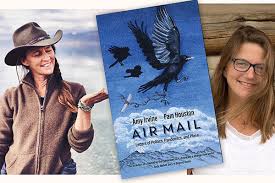Airmail: Writing Letters in a Time of Pandemic
It was while I was still in a state of admiration and envy at the re-election of Jacinda Ardern as New Zealand’s amazing premier, that I opened my current bedtime book and read ‘We are coming, I am sure of it, to either the end of the letting men be in charge of the world period of history, or the end of the human race’.
This observation is in a letter written by an author I love – Pam Houston to her friend, American author Amy Irvine. The two women live in Colorado, one each side of the mountain range. This is red MAGA country, ‘where mud and mountains and bringing home meat for the freezer’ is paramount, but both women are Democrats. They have chosen to set up home in the wilderness and try to live as eco-friendly an existence as they can. Until the arrival of the Covid Pandemic, their challenges had been mostly how to keep their horses, sheep and cattle from being eaten by bears or incinerated in wild fires. Both are outspoken feminists with histories of abuse and complicated relationships. Anyone who has read Pam Houston’s wonderful short stories, Cowboys are my Weakness, will understand what I mean.
They were already struggling under the man they describe as the ‘Monster in Chief’, when Covid arrived. Living in a Republican heartland has not been easy and has suddenly become more difficult:
‘agreeing to disagree isn’t going to cut it anymore as I watch this administration attack and destroy every single thing that brings me joy: air and water, trees and animals, every slice of wildness we have left, but also the arts, education, diversity itself.’
After the arrival of the virus confined them to their individual territories (Amy has a vulnerable daughter) someone suggested that they write letters to each other, recording their lives in lockdown. Both women were struggling to write in isolation. ‘I tried most of the afternoon to work on an essay and got mostly nowhere, but in correspondence the words come more easily.’ What has emerged is a sad, beautiful, funny, revelatory record of what it’s like to live in Trump’s America, in the age of Covid – ‘How we were, together apart’.
 |
| Pam Houston and her partner on her Colorado ranch |
Pam reflects that she would rather die being hugged by a Black Bear than a MAGA hatted Republican without a mask. The future is uncertain. The Pandemic is a hiatus, an ‘in between’, a pause, a place ‘between the world as it was and the world as whatever it will be after’. To Amy the pandemic feels inevitable ‘the natural expression of greed and corruption gone completely unrestrained.’ She also sees both the response to Covid and the climate catastrophe as an extension of toxic masculinity.
‘It’s never been so clear to me, this umbilicus between misogyny and the devastation of the natural world. . . As a woman who likes men a great deal . . . it’s hard to admit that such hatred exists’.
The book asks the question ‘what sort of stories do we tell now’? It challenges what it calls ‘the whitewashing [rightly named] of history’, that is buried so deep within the language we use to tell those stories it could render us dumb trying to eradicate it. Pam asserts her faith in ‘the concrete nouns of the world’, and believes that ‘we can build the world we want to live in, and we must, because time is short and inaction is death. Fighting for the Earth and each other will be the only way to feel how alive we still are.’ It’s an interesting choice of verb. In the state of Colorado gun checks have gone from averaging fifty in the system at any one time, to thirteen thousand.
This is an amazing book that kept me involved and also had me pencilling notes and underlining sentences on almost every page. The fact that I've scribbled all over it is a sign that this is a must-read!
Torrey House Press, October 2020



Comments
Post a Comment